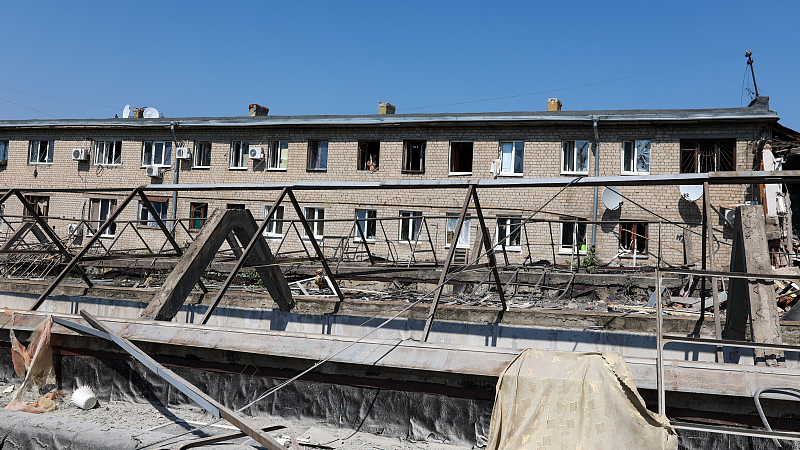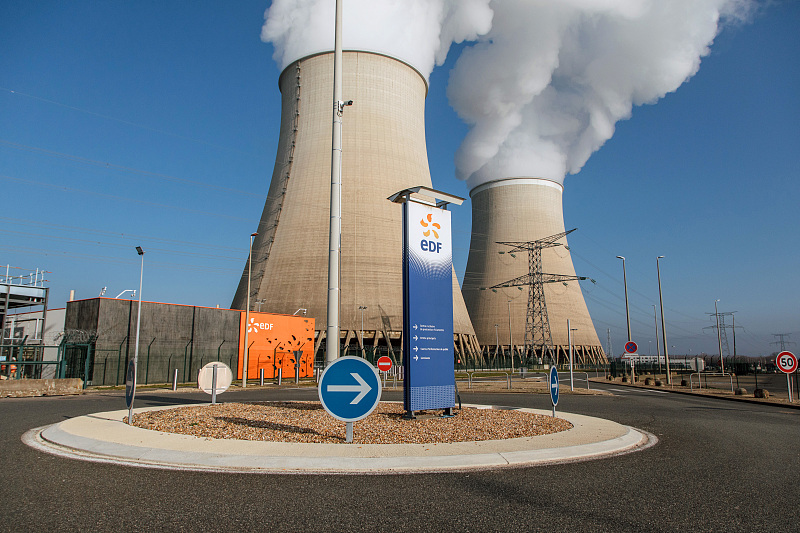
A view of the damaged site after a missile hit the dormitory building of city electric transport workers in Kharkiv, Ukraine, August 18, 2022. /CFP
A view of the damaged site after a missile hit the dormitory building of city electric transport workers in Kharkiv, Ukraine, August 18, 2022. /CFP
Editor's note: Bobby Naderi is a London-based journalist, guest contributor in print, radio and television, and documentary filmmaker. The article reflects the author's opinions, and not necessarily the views of CGTN.
The U.S. government plans to send a new $3-billion weapons package to Ukraine as Washington is shifting to a protracted campaign to support Kyiv in its war against Russia. At the same time, NATO has adopted a new strategic concept under which the military organization can no longer discount the possibility of an assault on sovereign NATO states. The strategic concept concludes that the Euro-Atlantic area now is "not at peace" in spite of no NATO member being in a state of war with Russia.
Behind this word play, a more dangerous policy change can be codified in a world where fiction is the new fact. There is no rush to re-establish diplomacy with Russia, and there is no turning around the arming of Kyiv under the Ukraine Security Assistance Initiative, which enables the U.S. government to buy weapons from Pentagon arms makers and send them to Ukraine.
When it comes to the rising energy crisis, however, the end of the story has yet to be written. The question is: Will the West find some way to write it that won't end in its own downfall amid the cracks of disunity among NATO countries?
Regardless of where the West is heading, there is no question that it has launched an economic war against Russia, which has no other choice but to take necessary countermeasures. The world is watching with great concern, while many people in the West have every reason to worry about the cost of living.
To see the world as it truly, the West is now paying a heavy price for sanctioning Russia. The European stock market is the worst, underperforming the U.S., while Europe's inflation, in countries like the UK and Germany, is worse than it is elsewhere. Mostly all of this is due to Russian sanctions on energy as punishment for its conflict with Ukraine. Those sanctions did set off a massive commodity price spike that has hurt the European economy the most.
And don't just blame the West or Russia for this mess. They didn't create our present world. In the global village where we live, all countries are interdependent. At stake are the global security and economy and everyone in it. There will be no winners in this trade and sanction war, and no one can remain unaffected by the Ukraine military conflict.
The U.S. and NATO, by launching unilateral investigations according to their own security laws and imposing bans on Russian products and energy, have seemingly closed the door to any diplomacy.
This hurts the interests of many EU companies, weakens the authority of the World Trade Organization and the UN, and jeopardizes the multilateral trading system and the European political order. It poses a serious threat to global growth and energy security as the global economy is yet to fully recover from the devastating COVID-19 pandemic.
The ongoing energy crisis and the economic warfare could cause further disorder of international trade, impending global recovery and hurting businesses and well-being of the people. As a result, the global economy could face a rising risk of recession by the end of this year. According to S&P Global's surveys, it is already at risk of sliding into recession.

Cooling towers release water vapor at the Nogent nuclear power plant, operated by Electricite de France SA, in Nogent-sur-Seine, France, December 21, 2021. /CFP
Cooling towers release water vapor at the Nogent nuclear power plant, operated by Electricite de France SA, in Nogent-sur-Seine, France, December 21, 2021. /CFP
If this is beginning to sound a little familiar, the reason is simple enough. It's a way for the West to turn the tables and put themselves in control. The sanctions on Russia disrupt European energy and supply chains. Russia is a major oil supplier with key links in global energy and supply chains.
Given the large volume of oil, gas and components from the country and other end-products exported to the European and world markets, Western sanctions hurt all multinationals that work with Russia.
In that mind-boggling context, slapping further sanctions and abusing bloc power and politics to crush Russian companies and undermine their partners only challenge the rules-based international order.
Multilateralism and mutually-beneficial cooperation are in the interests of all countries, while unilateralism and protectionism go against the trend of history and will lead to an all-encompassing economic turmoil. Facing bloc politics, countries cannot sit by in silence, seeing that anyone could be the next target.
The West's military marriage with Ukraine and the economic warfare against Russia may be entirely responsible for the severe setback in energy security in the Western hemisphere. This hasn't made the U.S. or NATO safe. Nor did it hurt Russia's economy. Quite the reverse, it has hurt global security, Western economies and energy markets.
Sanctions have only had a "limited impact" on production. Although Russian oil exports to Europe and the U.S. have dropped, the International Energy Agency said demand elsewhere has increased in a switch that blunted the financial impact on the Kremlin.
Concerning differences and frictions on NATO expansion and Russian security front, all sides may need to update their language and work together to find a way out of the present stand-off. It is the safest bet to de-escalate the situation and subsequently end the global energy crisis with all those first-class lies, for-profit mercenary warriors and expensive weaponry sales in the background.
Given the standard bullet-point repertoire, when it comes to diplomacy with Moscow, the law of the land for the U.S. and NATO partners doesn't have to be to show up with a gun in one hand and a stick in the other, and ask which Moscow would prefer.
(If you want to contribute and have specific expertise, please contact us at opinions@cgtn.com. Follow @thouse_opinions on Twitter to discover the latest commentaries on CGTN Opinion Section.)

